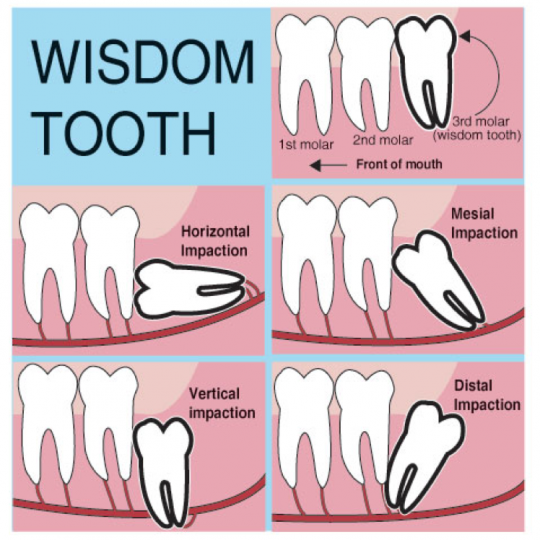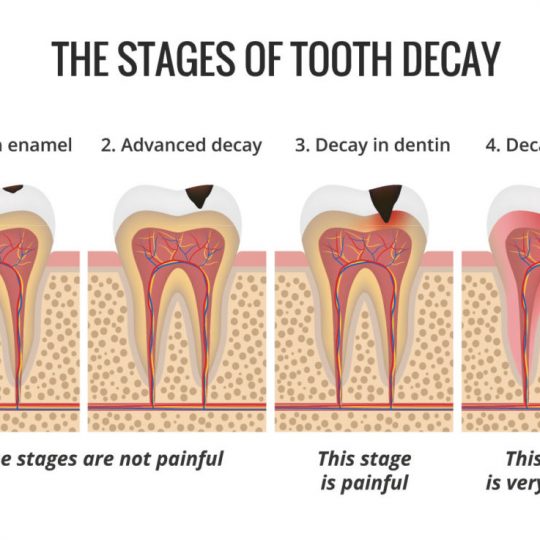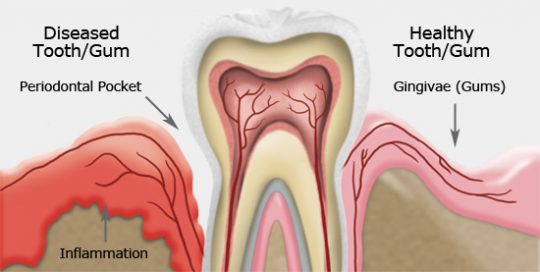Wisdom teeth: are a third set of molars in back of your mouth. They usually come in between the age of 17 and 25. Wisdom teeth extraction is one of the most common forms of oral surgery in dentistry along with other teeth. Sometimes Impacted wisdom teeth (Hidden in jaw) don’t cause any symptoms. Wisdom teeth which come in crooked can lead to painful crowding and disease. The only way your dentist will know they are impacted is from examining your regular dental x rays.
Teeth removed before age of 20 have less developed roots and fewer complications. American Dental association recommends that people between 16 and 19 have their wisdom teeth evaluated to see if they need to be removed.
Sometimes they can cause problems like following:
- Jaw pain
- Swelling around gums and jaw
- Bleeding gum
- Bad breath
- Difficulty opening mouth
- Unpleasant taste in your mouth
Reasons for removing wisdom teeth
- Extensive Tooth Decay: Wisdom teeth gets cavities very easily as most of the people miss brushing that far in their mouth leading to caries and eventually tooth decay.

- Tilted / Erupted Sideways: Wisdom teeth erupting at wrong angle start putting pressure on crown or roots of adjacent tooth which will eventually damage the neighbouring tooth. Routine dental checkup and x rays can help Dentist find that out for patient and extract the tooth before further damage to neighbouring tooth.
- Pericoronitis: Tooth partially covered by gums has more chances of infection as food gets trapped under the gums easily leading to inflammation of gums around the tooth and decay eventually.
- Impacted tooth: which means tooth hasn’t erupted in mouth properly as space is not enough and its hidden in the jaw completely or partially.
- Cyst: unerupted wisdom tooth can be enclosed in a cyst which can damage the nerves around in that area.
- Preventive efforts: Just because your wisdom teeth are not a source of pain doesn’t mean there is nothing wrong. There can be various reasons why your dentist wants to remove them like there is not enough space for wisdom teeth to erupt as your mouth is small and wisdom teeth can cause crowding and complications.
Impaction: Different kinds
Impaction of wisdom teeth means they are not erupted all the way into your mouth. Wisdom teeth can be impacted in different ways like:
- Mesial impaction: tooth is angled towards front of the mouth.
This is most common type of impaction.
- Vertical impaction: tooth is erupting straight but there is not enough space in the mouth to accommodate.
- Horizontal impaction: tooth is lying on its side in the jaw.
- Distal: tooth is tilted towards the back of the mouth
- Soft tissue impaction: tooth has erupted through the mouth.
- Bony impaction: tooth is still in the bone but has emerged through the gum.
Removal of wisdom teeth: different ways
Local anesthesia: Tooth which is fully visible in mouth is removed by simple procedure which involves numbing the area with anaesthesia and taking the tooth out. You should feel alert again shortly after the procedure.
IV Sedation: Surgeon will numb your mouth and also give you drugs through vein in your arm to make you drowsy. You might sleep through out the procedure.
General anesthesia: You get drugs through the vein or breath gas in your mask and you sleep through out the procedure.
Your dentist might have to cut through gum and bone to remove the tooth. Sutures might be placed to seal the wound if needed. Gauze is placed to control bleeding after extraction.
What to expect after surgery
In most of the cases, the recovery lasts only few days. The dentist usually prescribes some pain killers and antibiotics if needed.
These tips can help in better healing
- Bite gently on gauze for an hour. Change it if soaked in blood. If there is continuous bleeding see the dentist or go to the emergency. Your dentist would have given you the list to follow after the tooth removal.
- Use ice pack outside your cheek for 15 to 20 mins at a time for the first 24 hours. Ask your dentist for more details on using it.
- While your mouth is numb, try not to bite your cheek, lip or tongue.
- Relax and limit your physical activity as it may increase bleeding.
- Eat soft food like soup, pudding, pasta etc. Avoid hard crunchy, spicy food for few days.
- Do not use straw for few days. Sucking can loosen blood clot and delay healing.
- After 24 hours gently use warm salt water several times a day to reduce pain and swelling. This also keeps the extraction site clean.
- Do not smoke for at least 24 hours after surgery. Smoking decreases the blood supply and delays the healing process.
- Maintain good oral hygiene by brushing your teeth and tongue carefully.
- The dentist will remove the stiches after few days if needed.






